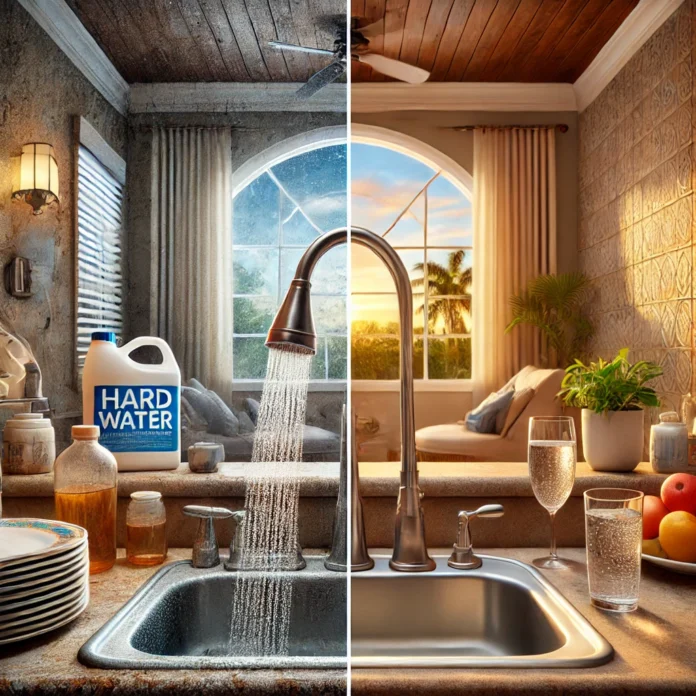If you live in Florida, you’ve probably noticed something about the water: it’s hard. Not “hard to find” (there’s plenty of it), but hard as in full of minerals like calcium and magnesium. This hard water can leave white spots on your dishes, scale buildup on faucets, and make your hair and skin feel less-than-soft. Enter the water softener—a device that’s part lifesaver, part luxury. But is it really worth it? Let’s dive into the pros and cons of having a water softener in Florida.
What Is Hard Water?
Hard water is water with a high mineral content, particularly calcium and magnesium. Florida’s aquifers are naturally rich in these minerals, which is why most Floridians deal with hard water every day.
How Hard Is Florida’s Water?
- Florida’s water is rated between hard and very hard, with 140–180 parts per million (ppm) of minerals in most areas.
- For context:
- Soft water: 0–60 ppm
- Moderately hard water: 61–120 ppm
- Hard water: 121–180 ppm
- Very hard water: Over 180 ppm
What Does a Water Softener Do?
A water softener uses a process called ion exchange to remove calcium and magnesium from the water, replacing them with sodium or potassium. This turns “hard” water into “soft” water, which is gentler on your skin, hair, appliances, and plumbing.
Why You Might Want a Water Softener in Florida
- Protects Your Appliances and Plumbing:
- Hard water causes scale buildup in pipes, water heaters, and appliances like dishwashers and washing machines. Over time, this can reduce efficiency and shorten their lifespan.
- Better Skin and Hair:
- Hard water can leave your skin feeling dry and your hair dull because it doesn’t rinse away soap and shampoo as effectively. Soft water is gentler and more moisturizing.
- Cleaner Dishes and Laundry:
- Hard water leaves spots on glassware and makes clothes feel stiff after washing. Soft water prevents these mineral deposits.
- Reduces Cleaning Effort:
- Soap scum and mineral stains are less likely to form with soft water, saving you time scrubbing faucets, sinks, and shower doors.
- Improves Water Heater Efficiency:
- A water heater filled with mineral buildup has to work harder, costing you more in energy bills. Soft water reduces this problem.
Why You Might Skip a Water Softener
- Initial Cost and Maintenance:
- Installing a water softener can cost between $1,000 and $3,000. Add to that the ongoing cost of salt or potassium refills (around $10–$30 per month).
- Sodium in the Water:
- Softened water contains small amounts of sodium, which might not be ideal for people on low-sodium diets.
- Alternatively, a potassium-based water softener can avoid this issue, but it’s more expensive.
- Environmental Concerns:
- The backwash water from a softener can contribute to salt buildup in the environment, which some municipalities in Florida regulate.
- Taste Preference:
- Some people prefer the mineral taste of hard water, finding softened water a bit “flat” or bland.
- Not Necessary for All Uses:
- Hard water is perfectly safe to drink and use, so if you don’t mind the spots on your dishes or the extra cleaning, you can skip the softener.
When a Water Softener Makes Sense in Florida
You Should Get a Water Softener If:
- You’re Tired of Buildup:
- If limescale is clogging your faucets or making your shower look gross, a softener will solve the problem.
- Your Skin and Hair Are Suffering:
- If you notice dry skin or dull, lifeless hair, soft water can make a big difference.
- You Want to Protect Your Appliances:
- If you’ve invested in high-end appliances, a water softener can help them last longer.
- You Have Hard Water Above 140 ppm:
- This is typical for most areas in Florida, and a water softener will greatly reduce the impact of the minerals.
You Might Skip the Water Softener If:
- You’re Renting:
- If you don’t own your home, the cost of installation might not be worth it.
- You’re Okay With a Little Extra Work:
- If you don’t mind descaling your appliances or scrubbing mineral stains occasionally, you can save money by skipping the softener.
- You’re on a Budget:
- The upfront cost of installation and ongoing maintenance might be a dealbreaker.
- You Already Use Filters:
- If you use point-of-use filters (e.g., for drinking water) and don’t mind hard water for cleaning, a softener may not feel necessary.
Alternatives to Water Softeners
- Water Conditioners:
- These don’t remove minerals but prevent them from sticking to surfaces, reducing buildup. They’re cheaper and more eco-friendly but less effective than softeners.
- Descaling Solutions:
- Products like vinegar can be used regularly to clean scale buildup from appliances and faucets.
- Point-of-Use Filters:
- Install filters on specific taps for drinking or cooking water, which doesn’t require softening.
The Verdict: Softener or Not?
Choose a Water Softener If You Want:
- Easier cleaning and no more limescale on your faucets and appliances.
- Softer skin and hair after showers.
- Longer-lasting appliances and lower maintenance costs in the long run.
Skip the Softener If You Can Live With:
- Some spots on your dishes and a bit of extra scrubbing.
- The upfront costs and maintenance responsibilities.
- The natural taste and feel of hard water.
Ultimately, in Florida’s hard water environment, a water softener can significantly improve your quality of life, but whether it’s worth the investment depends on your needs, priorities, and budget. If you’re tired of battling the hard water effects, it might be time to soften up!
Disclaimer: This article reflects the author’s opinion and personal experience. For specific advice on water softeners or water quality, consult a professional.




